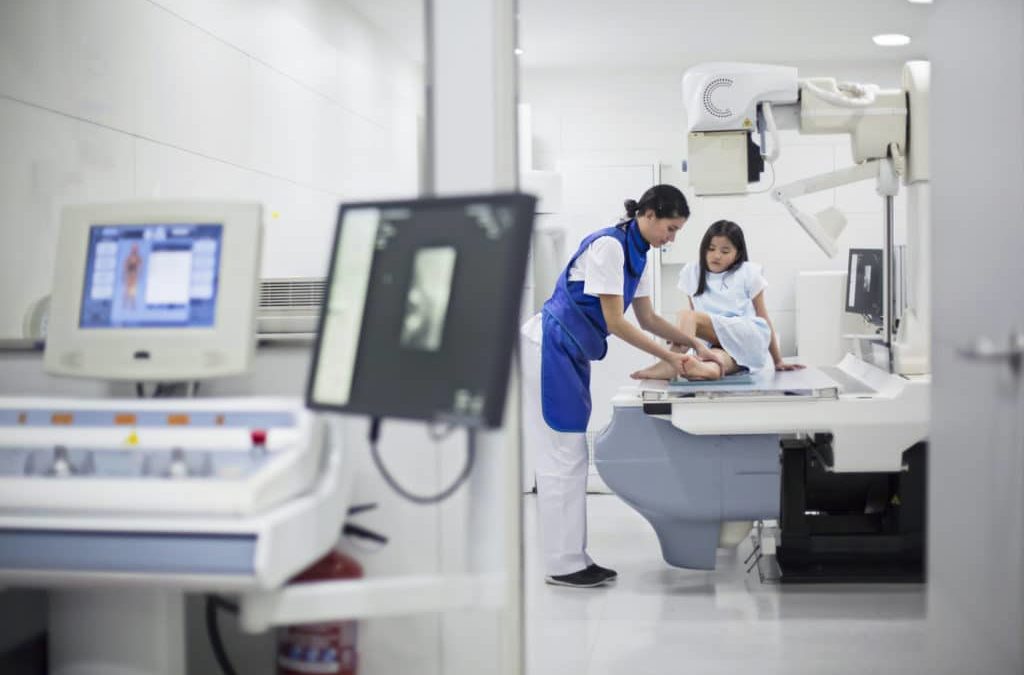Technology is driving a healthcare revolution. Building on data-mediated tools and practices, the ongoing digitalization of healthcare and personal wellbeing is set to reshape the nature of healthcare management. This healthtech revolution includes advancements in sensor-driven data collection, predictive analytics, and 5G telecommunications networks.
5G promises to significantly improve healthcare outcomes while supporting a new wave in innovation. Combining faster data-driven communication at lower latencies with an increasing focus on patient-centered empowerment, 5G will provide a robust infrastructure for healthcare innovation.
Disrupting healthcare

The truth is that the healthcare industry has been a laggard when it comes to integrating and deploying new technologies. Deeply embedded legacy systems and a challenging regulatory environment have combined to limit the evolution of healthcare. But this is changing.
The rise of a high-speed communication ecosystem promises to enable new companies to penetrate established value chains within the healthcare industry and initiate partnerships that benefit patients and medical professionals alike. Building on the shift toward preventive care and an increased focus on nutrition, exercise and wellness, innovative new companies are poised to disrupt and transform healthcare.
Data-driven technologies could reduce medical costs in the United States alone by as much as $175 billion to $220 billion annually.
In Finland, for example, the OuluHealth ecosystem is looking to transform healthcare on a global scale. Exploring cutting edge experiments in healthcare innovation, Oulu offers advanced communications and digital health technologies using 5G networks within a hospital environment. Established in 2012, OuluHealth is one of Europe’s leading digital health innovation ecosystems. OuluHealth’s network includes over 600 healthcare-related companies, many of which utilize high tech services.
The Innovation Age

Science and technology have always been the key drivers of healthcare innovation. In the 19th century, the germ theory of disease and the promotion of public health efforts revolutionized the nature of healthcare.
In the 1920s, the discovery of penicillin and the use of medication as a treatment for disease transformed the healthcare industry. In the 1970s, the application of randomized controlled trials (RCT) introduced the era of evidence-based medicine. Now as we enter the 2020’s, big data, AI, and patient-centric technologies are emerging as disruptive forces in remaking our understanding of healthcare research and delivery.
As consulting firm McKinsey and Company suggests, AI and big data is set to drive a revolution in healthcare. They estimate that data-driven technologies could reduce medical costs in the United States alone by as much as $175 billion to $220 billion annually.
In fact, by 2020, it is estimated that the healthcare industry will produce 2,314 exabytes of data, even as AI systems digest increasingly larger datasets. Where this level of data may have been an issue for 4G networks, it will not be a problem for 5G. 5G networks will accelerate the movement of data by reducing network lag and expanding data transfer rates.
In conjunction with data-driven technologies, 5G networks are opening new frontiers in “digital therapeutics,” allowing patients to receive care at home through augmented and virtual reality (AR/VR). Accelerating medical decision-making, 5G networks will allow medical professionals immediate access to substantial data while enabling healthcare professionals to more effectively anticipate, diagnose, and treat disease.
Living longer and healthier

One area where technologies like 5G will have a significant impact is eldercare. The growth in the percentage of aging and elderly populations around the world is driving a transformation in healthcare technologies.
Wearable devices, at-home testing services, secure online consultations, and telemedicine are now emerging to empower patients while improving resource efficiency. Leveraging wearables, for example, elderly patients would have access to AI-powered services that can monitor their biometric data and check for inconsistencies, including any significant mobility issues or sudden falls.
Technological advances like wearables are contributing to a preventive and value-based shift in which patients are empowered to increasingly manage their own healthcare outcomes.
The power of data
The good news is that the future of healthcare represents a huge opportunity for entrepreneurs and innovators with a vision for leveraging health technologies for personalized care.
Technological advances like wearables are contributing to a preventive and value-based shift in which patients are empowered to increasingly manage their own healthcare outcomes. Telemedicine and health apps are making it possible for doctors to see patients virtually, outside of traditional facilities, while enabling both increased access and tailored care. Together, with online diagnostic tools and genetic sequencing services, healthtech innovation holds the promise for supporting better informed and engaged patients.
Behind all of these trends is one fundamental force driving healthcare transformation today. That is the power of data. In healthcare, data is power. The promise of data to transform medicine and respond to the growing demand for tailored care represents a new threshold in how we understand the nature of health and healing.


Recent Comments